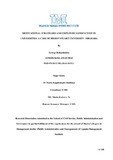| dc.description.abstract | The study investigated Motivational strategies and employee satisfaction in universities
considering Bishop Stuart as the case study. The study was interested in finding out the
relationship between rewards and employee satisfaction, establishing the influence of career
growth on employee satisfaction and how work-life balance affects employee satisfaction.
The study used case study as research design, documentary analysis, questionnaire survey and
interview were used as the methods of data collection.
The study involved both academic and non-teaching staff of the University as respondents. Data
was analysed quantitatively and qualitatively using statistical packages and tables; content and
interpretive analyses were also used for qualitative data.
The study found out that rewards positively enhance employee satisfaction, it was also found out
that the University has limited range of rewards also, that salaries do not increase with inflation
and that employees do not understand their reward plans.
Results also revealed that, career growth and work-life balance, positively influence employee
satisfaction. In relation to career growth the University has adequate opportunities for
professional growth, that employees receive the training needed to do the job well and that the
University supports employees to obtain new skills that all these increase employee satisfaction.
The results further indicate that employee satisfaction is positively influenced by work- life
balance. Further still it was found out that motivational strategies of the universities were found to be
inadequate in rating which may not fully provide satisfaction among employees.
The study concluded that rewards with pay rise have a moderate positive relationship with
employee satisfaction among University employees.
The study further concluded that Career growth with promotion and training positively influence
employee satisfaction and that promotion must match with payments.
The study recommended that: all stake holders should compose the reward structure to make
appropriate rewards that befit the employees in the University, career growth should be
accompanied by increased remuneration, in terms of improved allowances for better performance
as well as promotions and recognition, more activities that give staff some more time to be
creative be improved. | en_US |

